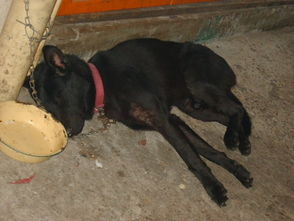
Understanding the Black Widow Bite on a Dog: A Comprehensive Guide
When a black widow spider bites a dog, it’s a situation that requires immediate attention. Black widows are known for their potent venom, which can cause severe reactions in both humans and animals. In this article, we will delve into the details of a black widow bite on a dog, covering symptoms, treatment, and prevention measures.
What is a Black Widow Spider?

The black widow spider, scientifically known as Latrodectus mactans, is a species of spider that is native to the Americas. They are characterized by their shiny black bodies, red hourglass-shaped marking on their abdomen, and venomous bites. While they are not aggressive, they will bite if threatened or accidentally touched.
How Does a Black Widow Bite Occur on a Dog?

Dogs can be bitten by black widows in various situations. They may come into contact with the spider while exploring, or the spider may be accidentally crushed when the dog is playing with a toy. Once bitten, the venom can cause a range of symptoms in the dog.
Symptoms of a Black Widow Bite on a Dog

After a black widow bite, a dog may exhibit the following symptoms:
| Symptom | Description |
|---|---|
| Swelling | The area around the bite may swell and become red. |
| Pain | The dog may experience pain and discomfort at the bite site. |
| Severe Muscle Pain | Black widow venom can cause muscle pain and stiffness throughout the body. |
| Paralysis | In severe cases, the venom can lead to paralysis, particularly in the legs. |
| Loss of Appetite | The dog may lose interest in eating. |
| Diarrhea | Black widow venom can cause gastrointestinal issues, leading to diarrhea. |
| Increased Heart Rate | The venom can affect the dog’s heart rate, leading to an increased heart rate. |
Treatment for a Black Widow Bite on a Dog
It’s crucial to seek veterinary care immediately if you suspect your dog has been bitten by a black widow. The following treatment options may be considered:
-
Wash the bite area with soap and water to prevent infection.
-
Apply a cold compress to reduce swelling and pain.
-
Administer pain medication as prescribed by the veterinarian.
-
Provide supportive care, such as keeping the dog warm and hydrated.
-
In severe cases, the veterinarian may administer antivenom to counteract the venom’s effects.
Prevention Measures
Preventing black widow bites on dogs involves taking certain precautions:
-
Keep your yard clean and free of debris, as black widows often hide in dark, undisturbed areas.
-
When hiking or exploring, be cautious of areas where black widows may be present, such as woodpiles, sheds, and underbrush.
-
Inspect toys and other items your dog may bring inside before allowing them to play with them.
-
Teach your dog to avoid picking up unfamiliar objects from the ground.
Conclusion
A black widow bite on a dog can be a serious situation, but with prompt veterinary care and proper treatment, most dogs recover fully. By understanding the symptoms, treatment options, and prevention measures, you can help keep your furry friend safe from this venomous spider.







